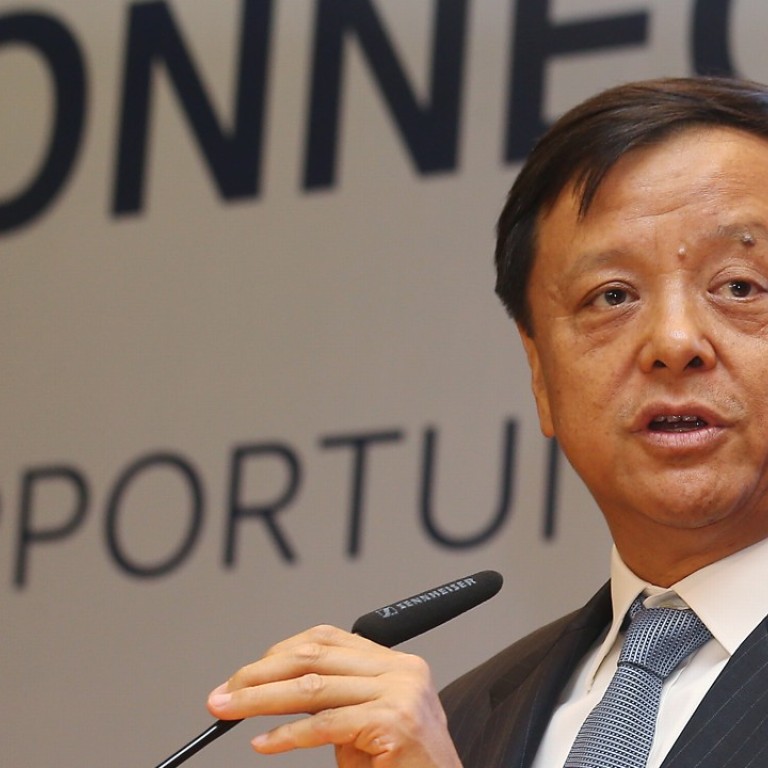
HKEX proposes latest ‘Connect’ system – this time to lure more foreign listings and then link them with Chinese shareholders
Charles Li Xiaojia, HKEX chief executive, says it and the SFC are working flatout to make the city more attractive as a listing destination for foreign firms, especially new economy companies
Hong Kong Exchanges and Clearing (HKEX) is working closely with both Hong Kong and mainland regulators on further moves to try to connect mainland and foreign investors with each other, Charles Li Xiaojia, chief executive of HKEX, told an audience at the Hong Kong Securities Institute on Thursday.
“Hong Kong needs more international companies to list here and mainland investors also like to use the Hong Kong market to invest in international companies,” said Charles Li Xiaojia, chief executive of HKEX.
According to his plans, HKEX is considering the creation of what’s being dubbed “Primary Connect” – a programme which would allow mainlanders to subscribe for new shares listing in Hong Kong, which in turn will hopefully attract more international firms.
He refused to give any further details or a timetable on this latest “Connect” initiative, and declined to confirm if those international companies already listed in New York or London, would be able to make secondary listings or secondary share placements via the proposed plan.
Hong Kong needs more international companies to list here and mainland investors also like to use the Hong Kong market to invest in international companies
The Hong Kong exchange already has two “Stock Connects” in place with their counterparts in Shanghai and Shenzhen, allowed cross trading of shares between the exchanges.
It also kicked off its “Bond Connect” programme in July which allows mainland Chinese bonds to be traded by international investors.
“This [new plan] still needs a lot of parties to discuss the details. What I can say is this new Primary Connect will benefit both the Hong Kong and mainland markets,” he said.
Li and HKEX have already prioritised their desire to increase the number of major international players listing in Hong Kong, as well as helping more mainlanders to trade here.
Major exchanges around the world, including Hong Kong, are licking their lips especially, over the prospects of hosting the upcoming initial public offering (IPO) of energy giant Saudi Aramco, expected to be the largest IPO ever when it floats in 2019.
Hong Kong stock market is the third largest in Asia in terms of market capitalisation but it is dominated by mainland companies, which take up 60 per cent of its total value with the rest predominantly Hong Kong companies, and a few international listings.
![“This [new plan] still needs a lot of parties to discuss the details. What I can say is this new Primary Connect will benefit both the Hong Kong and mainland markets,” said HKEX chief executive Charles Li Xiaojia. Photo: Jonathan Wong](https://cdn4.i-scmp.com/sites/default/files/images/methode/2017/09/21/bcea756e-9eb0-11e7-9b91-f74e36ea6345_1320x770_175647.JPG)
The government, along with HKEX and the Securities and Futures Commission, say they are working flatout together to make the city more attractive as a listing destination for foreign firms, especially new economy companies.
HKEX last month completed the consultation for a plan to launch a new board, referred to as the “third board”, for dual class shares companies or those newly start-ups without profit to list.
Brokers believe for Hong Kong to be a serious contender to land the Aramco IPO, or any other major multinational IPO for that matter, regulators would need to design the planned Primary Connect in a way to allow foreign listed firms to have secondary listings or placements.
Hong Kong also needs more diversify in its mix of constituent company listings, argue brokers, illustrated well with the fact that 56 per cent of the funds raised in the first half were by financial firms, and less than one per cent from new economy or technology firms.
“The comments we have received so far show there is a consensus that Hong Kong cannot afford to miss any opportunities to act as a fundraising hub for new economy firms,” Li said.
But he said it would still need a second round of consultation on the details of the new third board before it could be launched next year.
The new board is proposed to contain two markets – one is for big companies with dual share structure for all investors to trade and another is for start-ups for professional investors to trade only.
Many commentators consider the planned start-up market is a risky tactic, while others think dual-class share companies should be more encouraged to list on the main board, rather than the planned new one.
Li also said the bourse could also opt for what he termed a “landing zone” approach to make some change to the proposal regarding the third board plan.

